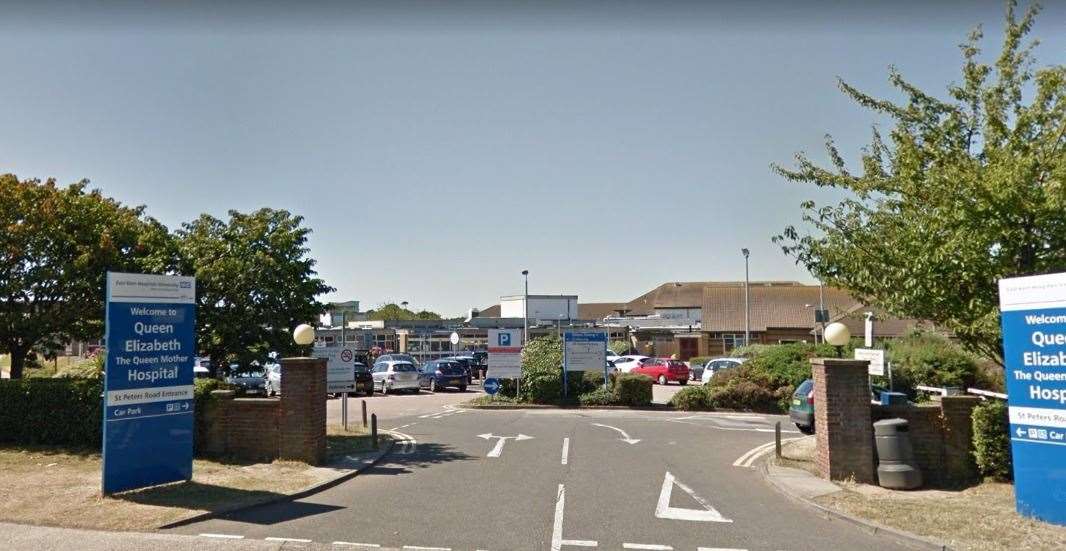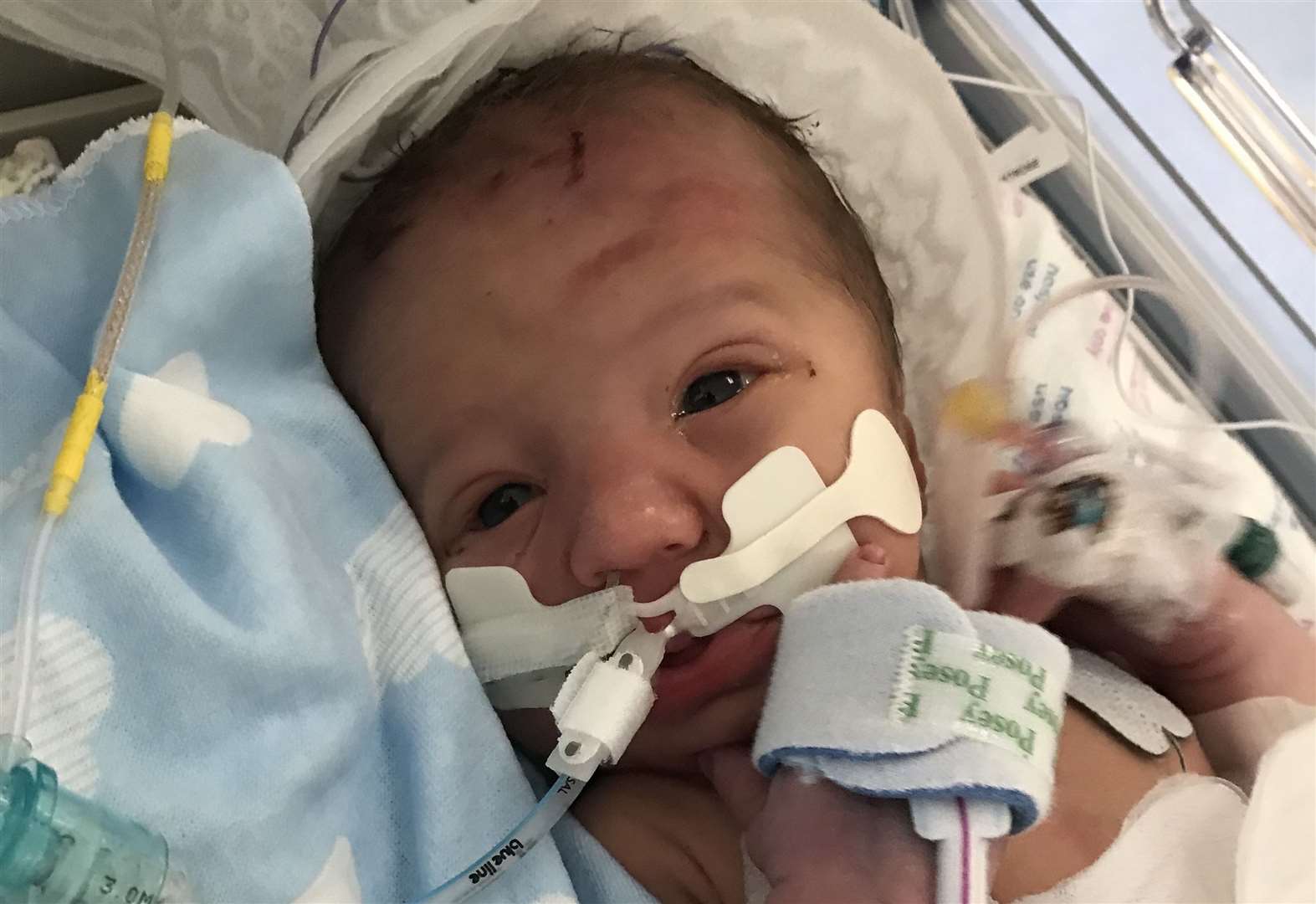East Kent Hospitals: Baby deaths spark review of maternity services
Published: 10:32, 23 January 2020
Updated: 16:39, 23 January 2020
A damning investigation into maternity services at East Kent Hospitals has revealed multiple concerns over medical practices and the possibility that some baby deaths could have been prevented.
The findings reveal that at least seven babies' deaths since 2016 might not have happened if standards had been higher.

In a separate report by the Royal College of Obstetricians and Gynaecologists, drawn up in 2015 but not handed to the Care Quality Commission by the hospitals trust until last year, investigators share worrying findings concerning the QEQM in Margate and the William Harvey in Ashford - but mainly at the Margate site.
It includes a reluctance by consultants to attend maternity units when requested and inconsistent rounds by them on the labour wards.
Investigators also found maternity units were 'vulnerable' out of hours, that guidelines were led by midwives with poor consultant participation, and that there were poor labour ward facilities at both sites.
Concerns were also raised over consultants failing to attend training for CTG - the process which monitors a baby's heart rate during labour.
In the report, seven cases were detailed where serious incident reviews had been carried out, with two involving the deaths of babies.
The links to seven deaths uncovered by the BBC and the report come ahead of the final day of the inquest into the death of Harry Richford, who died aged a week old after a traumatic birth at the QEQM in November 2017.

His family are pushing for an 'unlawful killing' verdict and a coroner will record his finding tomorrow.
During the almost three-week hearing, evidence was revealed of disagreements between medical staff, the panicked delivery and the 'out-of-depth' doctor who delivered Harry.
The baby, whose heart rate was seen to drop frequently during CGT monitoring, died of hypoxia, caused by lack of oxygen.
His mum Sarah had a trouble-free pregnancy and had initially gone to the midwifery-led unit in Margate as a low-risk mum-to-be.
In the BBC investigation, it was revealed another baby, Archie Powell, who died last February, might still be alive had it not been for a delay in treatment.
Archie was born at the QEQM with his twin sister Evalene on February 10 weighing a healthy 6lb 5oz but he contracted group B streptococcu.
He was transferred to the Evelina Hospital in London with his parents and newborn sister, but tragically died from sepsis on February 14.
An internal investigation by East Kent Hospitals found there had been a delay in treating his infection and his death was "potentially avoidable".
Mum Dawn, speaking to Kent Online during Baby Loss Awareness week last year, said the family are still trying to come to terms with his death.
In June last year, a hospital investigation was launched after an unborn baby died two days after midwives allegedly ignored a mum's worries about her daughter's heartbeat.
Shelley Russell from Aycliffe, Dover, was 36 weeks pregnant with baby Tallulah-Rai when she noticed reduced movements so went to hospital for a fetal heart rate scan.
The 38-year-old claims she was told there was "nothing to worry about" - but two days later she found out her baby had died in the womb.
A post-mortem revealed Tallulah-Rai, who weighed 7lb 6oz, had died of oxygen deficiency.
An internal investigation found CTG monitoring should have been continued for longer and an ultrasound arranged.
Further research by The Independent found between 2014 and 2018 there were 68 baby deaths at the trust for children aged under 28 days old.
Of those, 54 died within their first seven days.
In total, 138 babies suffered brain damage after being starved of oxygen during birth.
There were 143 stillbirths, which includes some late terminations.
In a statement released by the hospitals trust today, a spokesman says the scale of change needed in maternity service has not taken place quickly enough and the trust needs to fully embed further learning and changes in its culture.
"We recognise that we have not always provided the right standard of care for every woman and baby in our hospitals and we wholeheartedly apologise to families for whom we could have done things differently," she said.
"We have made significant changes to our maternity service in recent years to improve the care of women and their families.
"We are reviewing our service with some of England’s leading maternity experts to make sure we are doing everything we can to make rapid improvements to maternity care in east Kent.
"We have already made a number of changes to our maternity service."
"We will recruit more doctors to further improve 24/7 care on our labour wards..."
The trust says it has:
- Added more consultants and senior clinician oversight of births at our hospitals
- Invested in more maternity and neonatal equipment
- Put a comprehensive training programme in place for all maternity staff on identifying and safely supporting difficult births
- Revised our policy for recruiting and supervising temporary and junior doctors
- Implemented a more comprehensive way of monitoring babies’ health during labour.
"We are now investing in ‘centralised CTG monitoring’, which will allow babies’ health during labour to be displayed on monitors in the labour wards’ midwifery stations and viewed by consultants elsewhere in the hospital or on call," the spokesman said.
"This means staff can immediately be alerted to a potential problem and on call doctors will be able to provide expert opinion straight away, wherever they are.
"We will also recruit more doctors to further improve 24/7 care on our labour wards.
"We will be receiving support from the NHS Maternity Support Programme, which includes support from a Director of Midwifery from a Trust rated ‘Outstanding’ by the CQC; a Consultant Obstetrician and a Consultant Paediatrician, to work with us to make rapid and sustainable improvements to our service."
Reacting to the story, Canterbury MP Rosie Duffield said: "Shocking and deeply upsetting to be hearing more details about the crisis in maternity care at East Kent Hospitals.
"Urgent answers and a thorough investigation need to happen as soon as possible."
The trust was placed into special measures in 2014 following an inspection by the Care Quality Commission which rated its care, including maternity services, as inadequate.
It is now requires improvement.
A CQC spokesman said after tomorrow's finding in the Harry Richford inquest it will look at what action might be taken.
Canterbury's labour MP Rosie Duffield says the investigation highlights the situation of a number of families in East Kent who have "clearly been failed" by maternity services.
"Tomorrow we expect the inquiry in baby Harry Richford's tragic death to conclude and it is expected to be highly critical of the trust," she said.
"The trust in question has yet to score above 'requires improvement' with the CQC.
"There have been a number of changes in the top levels of management, but despite constant churn at the top real change on the ground has been minimal.
"Funding cuts have stripped back our NHS, taken away the resources it needs to be able to deal with problems in a sincere and timely manner.
"Unless our NHS sees meaningful investment, scandals like this will sadly only become more frequent.
"What we need now are concrete steps to ensure that the service today is safe for families.
"We'll know more when the inquiry is published tomorrow. For the time being, my thoughts are with the families tragically affected."
Pregnant wanting reassurance about their current care or women who have been under East Kent Hospitals’ maternity service in the past and have concerns about their care can contact the trust on 01233 651900.
Listen to KentOnline's daily news podcast to hear more about this story and others.
Read more: All the latest news from Thanet
Read more
Ashford Canterbury Deal Dover Faversham Folkestone Health Herne Bay Human Interest Hythe Kent News Sandwich Thanet WhitstableMore by this author
Marijke Hall